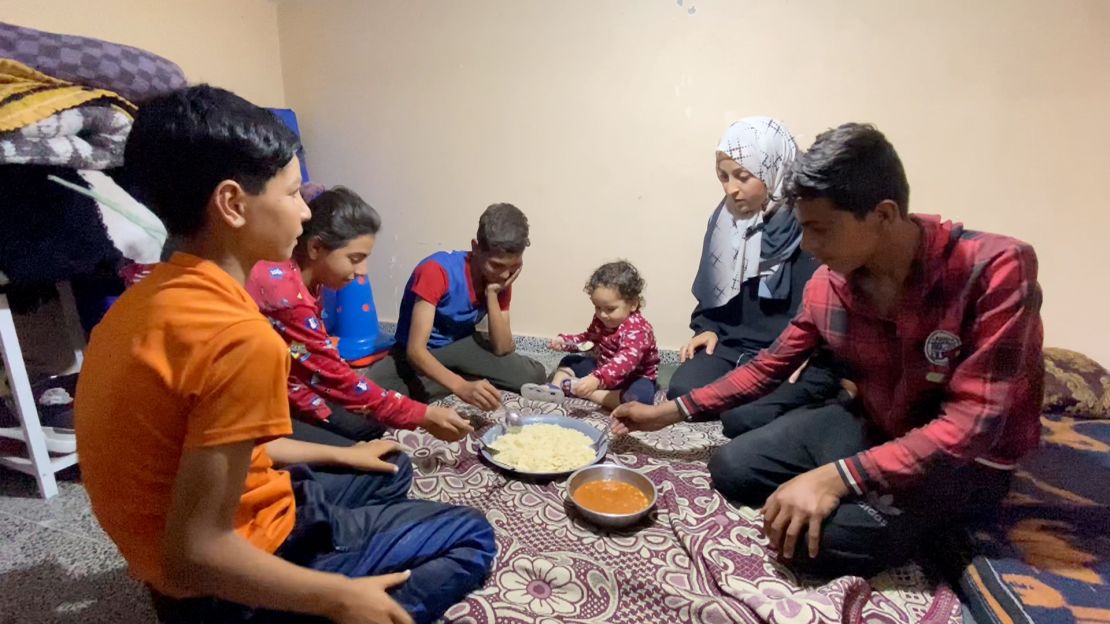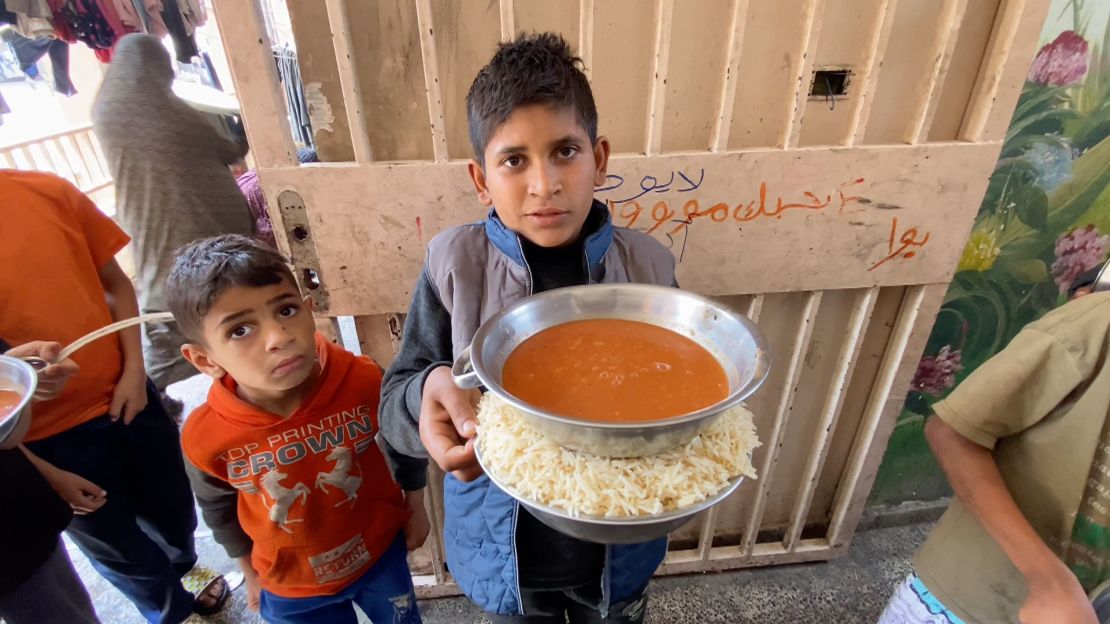Dozens of Palestinian children eagerly lined up for a meal in Deir al-Balah, in central Gaza, as aid workers unloaded huge saucepans of stew and rice from parked trucks under the bright sun.
CNN footage from the distribution site in front of a sprawling displacement shelter showed staffers from the World Central Kitchen (WCK) serving the children on Wednesday. More kids peered from high balconies where clothes draped over washing lines.
Palestinian mother Um Hassan told CNN her toddler was grateful to receive the plate of hot rice; their family had been surviving on canned food for weeks.

The World Central Kitchen, a US-based non-profit that focuses on fighting hunger around the world, resumed work in Gaza this week, after a hiatus following a series of Israeli military strikes that killed seven staffers in April and drew the world’s condemnation. Israeli forces have previously taken responsibility for the deaths, with Israeli Prime Minister Benjamin Netanyahu offering rare public acknowledgment and a promise to investigate the “tragic incident.”
World Central Kitchen founder Jose Andres wrote on Wednesday that returning to Gaza after losing his staff was not easy, but that the organization could not “stand by” as people in Gaza suffered.
“The decision… to restart feeding in Gaza is both the hardest and the simplest one we could make,” Andres wrote on X. “Hard, because only a month has passed since seven of our WCK colleagues were killed in an IDF attack. These humanitarian heroes risked everything to feed people they did not know and would never meet. And yet simple, because the need is so great. We cannot stand by while so many people are so desperate for the essentials of life.”
Human rights agencies have long warned of a spiraling humanitarian catastrophe in Gaza under Israel’s military’s seven-month assault, launched in response to the Hamas-led October 7 terror attacks. More than 34,600 Palestinians have been killed by Israeli attacks in Gaza as of May 1, according to the local ministry of health.
Over the course of the war, more than 1.9 million Palestinians have been forcibly displaced, according to the UN, with many sheltering in crammed tent camps that cannot offer enough access to sanitation or food.
The entire population of more than 2.2 million people is now at risk of famine, and at least 30 children have already died of malnutrition and dehydration in Gaza, according to the health ministry.

A local WCK staffer, Ashraf Al Sultan, told CNN on Wednesday that people in the Deir al-Balah shelter were clearly struggling.
“Since yesterday after we resumed working, we could see people’s desperation. People have no food, and we’ve all been displaced,” he said.
“[The World Central Kitchen’s] food makes people feel that they are at home. It is decent food, it is clean. They also treat people well.”
“I haven’t received a hot meal for a month because the kitchen team was struck. We only had canned food,” Zaki Sobeh, a young boy at the displacement site, told CNN after receiving his plate of food on Wednesday.
“I say thank you and may God protect them.”
A desperate need for more aid
Human rights organizations have repeatedly warned that Israel’s strict limitations on passage into Gaza is diminishing critical supplies and drastically hindering relief efforts within the Palestinian territory.
In March, the United Nations’ human rights chief, Volker Türk, warned Israel’s sustained restrictions on aid into Gaza may amount to the war crime of starvation.
Israel says there is “no limit” on the amount of aid that can enter Gaza, but its inspection regime on aid trucks has meant that only a tiny fraction of the amount of food and other supplies that used to enter Gaza daily before the war is getting in now.
Shortly after the deaths of the World Central Kitchen workers in April, Israeli officials agreed to open the Erez border crossing into northern Gaza to allow aid deliveries. Food shortages have been the worst there after Israel concentrated its military offensive there in the early days of the war.
On Wednesday, Israeli Defense Minister Yoav Gallant described the opening of Erez as “essential” to “increase the volume of humanitarian aid into Gaza.”
But efforts to increase aid have also run into repeated trouble. At least 48 aid trucks were blocked on Wednesday after Israeli settlers attacked a aid convoy en route to Gaza via the southern Kerem Shalom crossing, according to Jordanian authorities.
The US State Department also said Thursday that a delivery of aid that passed through Erez crossing earlier in the week had been temporarily intercepted by Hamas, which controls the isolated enclave, before being retrieved by the United Nations.
CNN’s Jennifer Hansler, Tim Lister, Eugenia Yosef, Mohammed Tawfeeq and Jonny Hallam contributed to this report.





